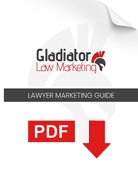
Introduction
Success of business lawyers hinges on their ability to effectively market their services online. While many digital marketing tools exist, Pay-Per-Click (PPC) advertising is a standout strategy that can exponentially increase your online reach and attract potential clients. In this extensive guide, we’ll dive into the world of PPC advertising for business lawyers. We will explore what PPC is, why it’s essential, and how to harness its power for your practice.
Traditionally, legal marketing relied heavily on word-of-mouth referrals, networking, and in some cases, print advertising. However, the digital age has ushered in a paradigm shift, completely revolutionizing how business lawyers approach marketing.
The digital landscape allows for precise targeting, interactive communication, and real-time analytics, providing a stark contrast to traditional marketing methods. Among these online marketing strategies, PPC advertising has emerged as a powerful tool.
PPC advertising presents a ripe opportunity for business lawyers to increase their online visibility, connect with prospective clients, and maximize the return on their marketing investment.
II. Unraveling Pay-Per-Click (PPC) Advertising
To master PPC, it’s essential to start with the basics. Pay-Per-Click (PPC) advertising is a digital marketing model where advertisers pay a fee each time a user clicks on their ad. Unlike organic traffic, which relies on earning visits organically, PPC allows lawyers to essentially buy visits to their websites.
A Precision Targeting Tool
For business lawyers, PPC advertising is a precise targeting tool. It enables them to showcase their services on various online platforms, reaching out efficiently and effectively to potential clients. By displaying targeted ads based on specific keywords, lawyers can position themselves in front of potential clients actively seeking legal assistance.
The Dominance of Google Ads
In PPC, Google Ads reigns supreme. Its widespread usage and comprehensive features make it an ideal choice for lawyers. Google Ads leverages the extensive reach of the Google search engine, enabling lawyers to connect with potential clients.
However, alternatives like Bing Ads, Facebook, and LinkedIn offer their own PPC advertising platforms, catering to a range of audiences and budgets. These platforms empower business lawyers with choices to align their marketing strategy with their specific target audience.
III. The Benefits of PPC Advertising for Business Lawyers
We now explore the myriad benefits that PPC offers business lawyers and how it plays a pivotal role in enhancing their online presence.
Precision Targeting: Find Your Niche
One of the most compelling advantages of PPC advertising is its precision targeting capabilities. Lawyers can hone in on specific audiences based on parameters such as location, demographics, and interests. For instance, a business lawyer in Miami can fine-tune their ads to show only to individuals within Miami interested in commercial law.
This level of targeting ensures that ads reach the most relevant audience, increasing the likelihood of conversion and optimizing campaign effectiveness.
Immediate Results: The Power of Instant Visibility
In contrast to organic SEO, which often takes time to deliver results, PPC advertising offers immediate visibility. As soon as a PPC campaign goes live, it starts driving traffic to the website, generating potential leads and inquiries. This immediacy is especially beneficial for lawyers who require rapid client acquisition.
With PPC, lawyers can instantly position themselves at the top of Search Engine Results Pages (SERPs), capturing the attention of individuals actively seeking legal representation.
Cost Control: Managing Budgets Effectively
Lawyers can set daily and monthly budgets according to their financial capacity, ensuring they don’t overspend. Moreover, the pay-per-click model implies that payment is only made when a user interacts with the ad, making it a cost-effective approach to marketing.
This flexibility allows attorneys to strategically allocate their budget, maximizing their return on investment (ROI).
Measurable ROI: Data-Driven Decision Making
PPC advertising offers a unique advantage in terms of measurable ROI. Comprehensive analytics and reporting tools provide insights into the success of campaigns, enabling data-driven decision making. Lawyers can assess key metrics such as click-through rate (CTR), conversion rates, and cost-per-acquisition (CPA), gaining a deeper understanding of their campaign performance.
This data-driven approach allows for the continuous refinement of PPC campaigns, leading to improved results and higher ROI.
Campaign Customization: Showcasing Your Expertise
PPC advertising also offers extensive customization options. Lawyers can craft compelling ad copy that highlights their unique selling points and key messages. By incorporating relevant keywords into their ads, they enhance their ad quality score, which can lead to higher rankings and improved visibility on SERPs.
Customization ensures that a lawyer’s expertise and experience are effectively communicated, setting them apart from the competition.
PPC advertising empowers business lawyers to reach their target audience with precision, generate immediate results, maintain cost control, measure ROI, and customize comprehensive campaigns to stand out.
IV. Crafting PPC Strategies for Success: A Business Lawyer’s Guide
Achieving success in PPC advertising requires meticulous strategy and execution. This section delves into specific strategies that business lawyers can employ to optimize their PPC campaigns, ensuring they not only reach their target audience but also convert them into clients.
Keyword Research
The foundation of any successful PPC campaign lies in thorough keyword research. Identifying the most relevant and high-value keywords is crucial. Lawyers can leverage tools like Google Keyword Planner, SEMrush, and Moz Keyword Explorer to gain invaluable insights into keywords that can optimize ad effectiveness.
Once these keywords are identified, they should be strategically incorporated into ad campaigns. This includes adding them to ad copy, headlines, and landing page content, thereby improving the ads’ visibility and relevance to the targeted audience.
Landing Pages
A well-designed landing page can significantly boost conversion rates. It’s important for landing pages to align with the promises made in the ad copy and provide valuable information that addresses potential clients’ needs and concerns.
Clear and prominent calls-to-action can guide users toward taking the desired action, such as filling out a contact form or calling the law firm directly. Ensuring a seamless user experience from clicking on the ad to navigating the landing page can increase the chances of conversion.
Ad Monitoring and Optimization
Continuous monitoring and optimization of PPC campaigns are crucial for sustained success. Key performance metrics such as click-through rate (CTR), conversion rate, and cost-per-acquisition (CPA) should be regularly reviewed.
By identifying underperforming keywords or ad variations, attorneys can adjust their bidding strategies, ad scheduling, and targeting settings to optimize campaign performance. Additionally, performance data can be used to refine landing pages based on user behavior and preferences, yielding valuable insights for improving campaign effectiveness.
Ad Extensions: Enhancing Visibility and Functionality
Ad extensions can significantly enhance the visibility and functionality of PPC ads. These extensions provide additional information beyond the basic ad copy, making ads more informative and engaging.
Call extensions allow users to call the law firm directly from the ad, increasing the chances of immediate contact.
Location extensions display the law firm’s address, facilitating potential clients in finding the office.
Sitelink extensions direct users to specific pages on the law firm’s website, highlighting relevant practice areas or services.
By effectively utilizing ad extensions, lawyers can improve the user experience, increase ad visibility, and drive more qualified traffic to their site.
By implementing these strategies, business lawyers can supercharge their PPC efforts, paving the way for online success.
V. Advanced Strategies for PPC Mastery
To further enhance the effectiveness of PPC campaigns, business lawyers can explore advanced strategies that enable them to stay ahead of the competition and maximize their online reach.
Remarketing Campaigns: Rekindling Interest
Remarketing campaigns are a potent tool where you target users who have previously visited your website. This strategy is beneficial as it reinforces your brand and encourages return visits by keeping your services top-of-mind. The beauty of remarketing is that it allows you to reach people who have already shown interest in your services, thus increasing the potential for conversions.
Competitive Analysis: Learning from the Competition
Understanding what your competitors are doing can be invaluable. By monitoring competitors’ keywords and strategies, you can gain insights that help you refine your own campaigns. This doesn’t mean copying your competitors but rather learning from their successes and failures to improve your own approach.
Geo-Targeting: The Power of Localization
Geo-targeting is an effective way to focus your ads on specific geographic regions. For business lawyers, this ensures that your ads reach local clients who are likely to require your services. By tailoring your ads to a specific location, you can increase relevancy and, therefore, the likelihood of conversions.
Ad Scheduling: Timing Is Everything
Ad scheduling refers to the strategic timing of when your ads appear. By understanding when your target audience is most active or likely to convert, you can schedule your ads accordingly. This ensures your ads are being seen at the most opportune times, maximizing your ad spend.
VI. Overcoming PPC Challenges
While PPC advertising offers numerous benefits, it also poses challenges. Addressing these challenges is crucial for business lawyers looking to succeed in the digital realm.
Budgeting Challenges
High competition for certain keywords can make budgeting a challenge. To address this, law firms should focus on allocating budgets effectively. This might mean bidding on long-tail keywords that are less competitive but highly relevant or optimizing ads to improve quality scores, which can reduce cost-per-click.
Ad Positioning
Maintaining a competitive ad position within budget constraints can be difficult. One strategy is to focus on ad quality over quantity. Google rewards high-quality ads with better positions, so ensuring your ads are relevant and engaging is key.
Quality Score Improvement
Improving ad quality scores is crucial for PPC success. Tips include ensuring your ad copy aligns with your landing page content, using relevant keywords, and providing a seamless user experience on your landing page.
Keyword Match Type
Understanding the nuances of keyword match types is essential. Broad, phrase, and exact match types each have their advantages and disadvantages. Lawyers should choose the right match type based on their campaign goals, budget, and how broad or specific they want their reach to be.
VII. Emerging Trends in PPC Advertising
The world of PPC advertising is continually evolving, with new trends and innovations changing the landscape. Business lawyers must stay informed and adapt to these trends to remain competitive.
Voice Search: The Rise of Voice-Activated Devices
The rise of voice-activated devices like Alexa, Siri, and Google Home has led to an increase in voice searches. This trend impacts PPC strategies as it requires a shift in keyword strategy to accommodate more natural language queries. Lawyers can adapt by incorporating long-tail keywords that mimic how people speak.
AI and Machine Learning: The Era of Automation
These technologies help optimize campaigns by predicting user behavior and automating manual tasks. For example, they can analyze large amounts of data to identify trends and patterns that can inform bidding strategies.
Video Advertising: The Power of Visuals
Lawyers can leverage platforms like YouTube to reach a broader audience. Video ads can be used to explain complex legal concepts or showcase client testimonials, adding a human touch to your brand.
VIII. Ethical Considerations in PPC for Legal Professionals
Running PPC campaigns as a legal professional necessitates a careful balance between effective marketing and ethical considerations. Lawyers must ensure that their advertising practices align with the professional ethics and legal advertising regulations outlined by their respective state bars and the American Bar Association.
Truthful Advertising: Honesty as the Best Policy
All claims made in PPC ads must be truthful, accurate, and capable of being substantiated. Exaggerated promises or misleading information can lead to severe penalties, including disbarment. For instance, if a lawyer advertises a 100% success rate, they must be able to back this up with factual evidence.
Confidentiality: Respecting Client-Attorney Privilege
Lawyers are bound by client-attorney privilege, which extends to advertising. Any client information used in case studies or testimonials must be anonymized unless explicit consent has been given. Even then, it’s essential to tread carefully to avoid breaching confidentiality.
Respect and Fairness: Maintaining a High Standard
PPC ads should not exploit a person’s physical, emotional, or financial state. This includes avoiding fear-based marketing tactics or exploiting current events for gain. Lawyers should maintain a high level of respect and fairness in all their advertising efforts.
IX. The Role of Social Media in PPC Advertising
Social media platforms offer a powerful avenue for lawyers to bolster their PPC advertising efforts. Platforms such as Facebook, LinkedIn, Instagram, and X provide valuable opportunities to reach a broader audience and engage with potential clients.
Facebook Advertising: Targeting a Wider Audience
Facebook offers robust advertising options that can be seamlessly integrated with your PPC campaign. The platform’s vast user base allows you to reach a diverse audience. You can create highly targeted ads by specifying demographics, interests, and behaviors, ensuring that your message reaches the right people. Facebook’s ad formats, including image and video ads, can help you tell your brand story effectively.
Additionally, Facebook Pixel, a piece of code for your website, enables you to track user interactions and gather valuable data for optimizing your PPC campaigns. By aligning your Facebook advertising with your PPC efforts, you can create a cohesive online presence.
LinkedIn Advertising: Connecting with Professionals
For business lawyers catering to corporate clients or professionals, LinkedIn is an invaluable platform. Its advertising options allow you to target users based on their job titles, industries, and company sizes. Sponsored Content, Sponsored InMail, and display ads can help you establish your presence among the professional audience. LinkedIn also provides conversion tracking, enabling you to measure the impact of your ads on lead generation and conversions.
Instagram Advertising: Visual Storytelling
Instagram, with its visual and engaging format, is an excellent platform for sharing your firm’s story. Instagram ads appear in users’ feeds or stories, offering a non-disruptive way to showcase your services and connect with a younger, visually-oriented demographic. By combining your PPC campaign with Instagram advertising, you can reinforce your message with captivating visuals.
X (formerly Twitter) Advertising: Real-Time Engagement
X allows real-time engagement and conversation with potential clients. Promoted X and X Ads can help you target users based on their interests, keywords, and demographics. Participating in relevant discussions and using hashtags can enhance your reach and visibility. Integrating X advertising into your PPC strategy ensures that you engage with an audience looking for immediate information and solutions.
X. Measuring Success: Key Performance Indicators (KPI)
Measuring the success of your PPC campaigns is essential to refine your strategy and maximize ROI. Several key performance indicators (KPIs) are crucial in assessing the effectiveness of your campaigns:
Click-Through Rate (CTR):
CTR indicates the percentage of users who click on your ad after seeing it. A higher CTR suggests that your ad copy, keywords, and targeting are resonating with your audience.
Conversion Rate:
The conversion rate measures the percentage of users who take the desired action, such as filling out a contact form or calling your law firm after clicking on the ad. It reflects the effectiveness of your landing page and the quality of your ad.
Cost-Per-Click (CPC):
CPC represents the amount you pay for each click on your ad. Optimizing your CPC ensures that you’re not overspending on your budget.
Quality Score:
Quality Score is a metric used by platforms like Google Ads to assess the quality and relevance of your ads. A higher Quality Score can lead to better ad positions and lower costs.
Return on Investment (ROI):
ROI is the ultimate indicator of your PPC campaign’s success. It measures the profitability of your ad spend. By calculating your ROI, you can determine whether your campaigns are generating more revenue than they cost.
Customer Acquisition Cost (CAC):
CAC represents the cost of acquiring a new client through your PPC campaign. It helps in evaluating the cost-effectiveness of your advertising efforts.
Ad Position:
Ad position reflects where your ad appears on the search results page. A higher ad position generally leads to more clicks and visibility.
Impression Share:
Impression Share measures the percentage of times your ad is shown concerning the total number of times it could be shown. Maximizing your impression share ensures you’re not missing opportunities to reach your audience.
Return on Ad Spend (ROAS):
ROAS measures how much revenue you generate for each dollar spent on advertising. A high ROAS indicates that your campaigns are profitable.
XI. Continuous Improvement: A/B Testing and Optimization
Achieving excellence in PPC advertising is an ongoing process. Regularly conducting A/B tests can help you fine-tune your campaigns. A/B testing involves creating two versions of an element (e.g., ad copy, landing page, or headline) and comparing their performance. By systematically testing and optimizing different elements, you can enhance your campaign’s effectiveness and efficiency.
Additionally, staying updated with industry trends, competitor strategies, and platform updates is vital. A proactive approach to adapting to changes in the digital marketing landscape is essential for maintaining a competitive edge.
XII. Conclusion
PPC advertising is a powerful instrument for transforming your business law firm’s online presence and driving significant growth. By implementing these tips, you can position your law firm for success and attract highly qualified clients. Mastering PPC advertising may be challenging, but the rewards are substantial. As a business lawyer, your online presence is more critical now than ever.
Learn how to effectively leverage Google’s Local Service Ads for your Business Law Firm.
Need help with PPC for your law firm? Contact the Gladiator Law Marketing team. For over 10 years we have been helping business law firms grow with actionable, data-driven marketing strategies. Our track record speaks for itself, with a remarkable 95% client retention rate. From award-winning websites to high-ROI SEO, PPC and Social Media campaigns, Gladiator Law Marketing can help your law firm stand out in a crowded marketplace. Contact us at 888-683-3212.







